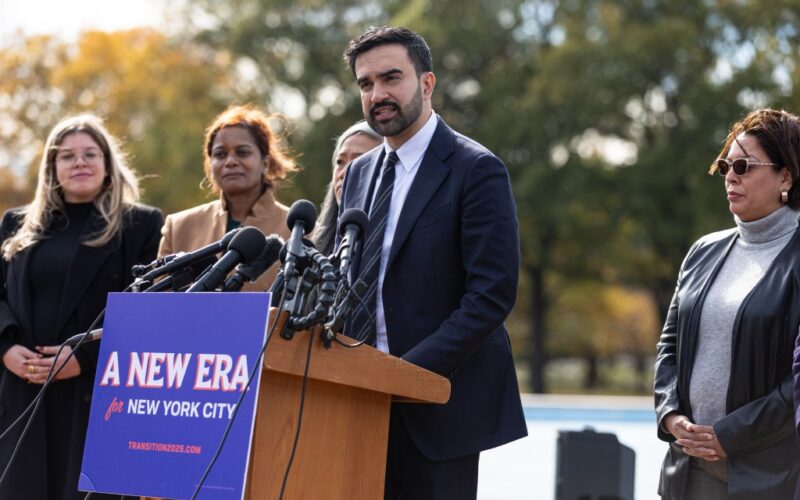As the media and the debates made clear, the question of crime, and the perception of crime, took on prominence in the mayoral election. While Andrew Cuomo and Curtis Sliwa proposed adding thousands of police officers, Zohran Mamdani took a different tack. In addition to touting his proposed Department of Community Safety, he promised to maintain current police levels and to keep the current NYPD commissioner, Jessica Tisch.
Adding thousands of police officers would cost between $300 and 500 million, so it begs the question whether crime is on the rise, and, if so, would more police officers make a difference. And, given the inevitable budgetary tradeoffs, where would these millions of dollars come from? After all, New York already has the largest police force in the nation. In fact, the NYPD is larger than the police force in many countries.
According to Mayor Adams and Tisch, crime is dropping at historic rates in what Adams proudly proclaims is “the safest big city in the world.” Further, there is no proof of a direct connection between the number of police officers and the crime rate. Former Mayor Mike Bloomberg inherited 40,000 police officers. During his term, reported crime dropped, as did, by almost 6,000, the number of cops.
Mamdani’s progressive bona fides on criminal justice issues were a motivating factor for many of his supporters, and his support for Tisch is seen by many as a betrayal of his values and a capitulation to politics as usual. The similarities with former Mayor Bill de Blasio are obvious. While proclaiming a forward-looking, progressive agenda, including ending stop-and-frisk, he looked backward and named Bill Bratton, Rudy Giuliani’s first NYPD commissioner, to run the NYPD.
While de Blasio hoped that Bratton would shore up his criminal justice credentials and combat any notion that he was soft on crime, it did not end well. Bratton resigned a few years into his term, and the NYPD rank and file famously turned their backs on de Blasio at the funeral of Police Officer Wenjian Liu.
It is probably too simplistic to dismiss Mamdani’s pursuit of Tisch as merely a tactic to address fears that he is weak on public safety. Surely, that is a motivating factor, but ultimately it reflects that criminal justice reform, no matter how meritorious, is always the sacrificial lamb of progressive ideas.
As a member of the state Assembly, Mamdani vocally championed criminal justice reforms — notably, bail, raise the age, and discovery reforms that addressed the disproportionate impact the criminal law had on people of color.
Mamdani’s support reflected his recognition that the freedom to remain free to fight criminal charges should not depend on the size of your bank account; that young people are, according to current neuroscience and the Supreme Court, still developing and therefore less culpable than adults; and that people charged with crime should be fully and timely apprised of the evidence against them.
Tisch has vocally championed rolling back these very reforms. At a Citizens Budget Commission breakfast Tisch stated that “In my opinion” a spike in crime around the time of the pandemic was attributable to bail reform. Tisch also blamed an increase in youth violence on Raise the Age legislation, claiming that “juveniles live in a virtually consequences-free environment.” And while Mamdani said “There can be no rollbacks to discovery reform,” Tisch argued for rollbacks to close what she termed dangerous loopholes that favor defendants.
While neither the mayor nor the NYPD commissioner control the state’s legislative process, both have a bully pulpit to influence public opinion and individual legislators. Closer to home, there are also profound differences between Mamdani and Tisch on NYPD tactics like quality of life policing in any of its iterations.
For many people, the public safety issue is about perception — even as crime is decreasing, the perception of crime is not following suit. That perception is influenced by concerns of homelessness or mental illness as reflected in people on the street or in the subway.
The centerpiece of Mamdani’s public safety plan is a Department of Community Safety to deploy mental health teams to respond to specific 911 calls. That approach, rather than simply adding more police officers or rolling back reforms, resonated with Mamdani supporters.
With his endorsement of Tisch, the question now is whether Mamdani will continue to press for, and uphold, the reforms he supported, or whether his choice for commissioner portends a willingness to move rightward, especially on criminal justice issues, in the name of trying to advance his affordability agenda.
Zeidman is a professor at CUNY Law School and founder and co-director of the Second Look Project NY.








